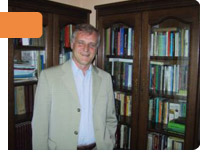NATO Review topical page about:
new media

The US is the home of social media. Facebook, Twitter, YouTube and many others were born there. So could social media be the means that brings NATO closer to US people? We asked a number of communications experts what progress they feel has been made - and what more needs to be done.

US bloggers, journalists and communications experts reveal how they would try to bring NATO closer to the US public.

9/11 heralded an age of new threats. Not least of these is the cyber threat. Here, Olaf Theiler outlines how NATO has had to adapt quickly to a fast changing, pervasive and often cheap security threat.

Egypt and Tunisia's former rulers have been deposed. Some other governments in the region are unsure how long - or if - they will last. How much evidence is there that social media was behind these changes?

Does social media make political change easier? Is it true that it has already been the force behind political changes? Here, experts outline how social media has been a game changer - but also the limits it has.

"Revolution 2.0" took place in Egypt according to some sources. Not so, argues Will Heaven. He points to compelling evidence which indicates that the West may be guilty of seeing events in Egypt through a Western prism.

Social media has made major changes says Susannah Vila. It’s importance in recent uprisings shouldn’t be underplayed. But these same events have also shown that one of social media’s strengths – being leaderless – can also prove one of its weaknesses.

NATO Review video debate. Representatives from the military and new media discuss how the growth of video postings, blogs and other new media impact on operations, mission support and morale in conflict zones.

Nasim Fekrat is a young Afghan whose blogs and photos have won international recognition. He sees new media as a key part of creating a new, more democratic society in Afghanistan. He gives NATO Review a insight into the effect new media has had on him and his country.

Few people know what it's like to be in a conflict situation as both a soldier and then a reporter. Vaughan Smith is one of those people. He describes how he sees the military's view of the media, both when he was a soldier and now as he makes full use of new media techniques in places such as Afghanistan.

How does working with the new media compare to working in the old media. Robert Pszczel highlights some of the differences - as well as giving an insight into how the media worked in the old Soviet bloc.

The ISAF spokesman's position in Afghanistan is a key one in managing modern day messages in a conflict zone. Nicholas Lunt held this position last year and tells NATO Review the lessons learned.

quotes
Benjamin Franklin (1706-1790),
Poor Richard's Almanac, 1746
When the well is dry,
we know the worth of water





















